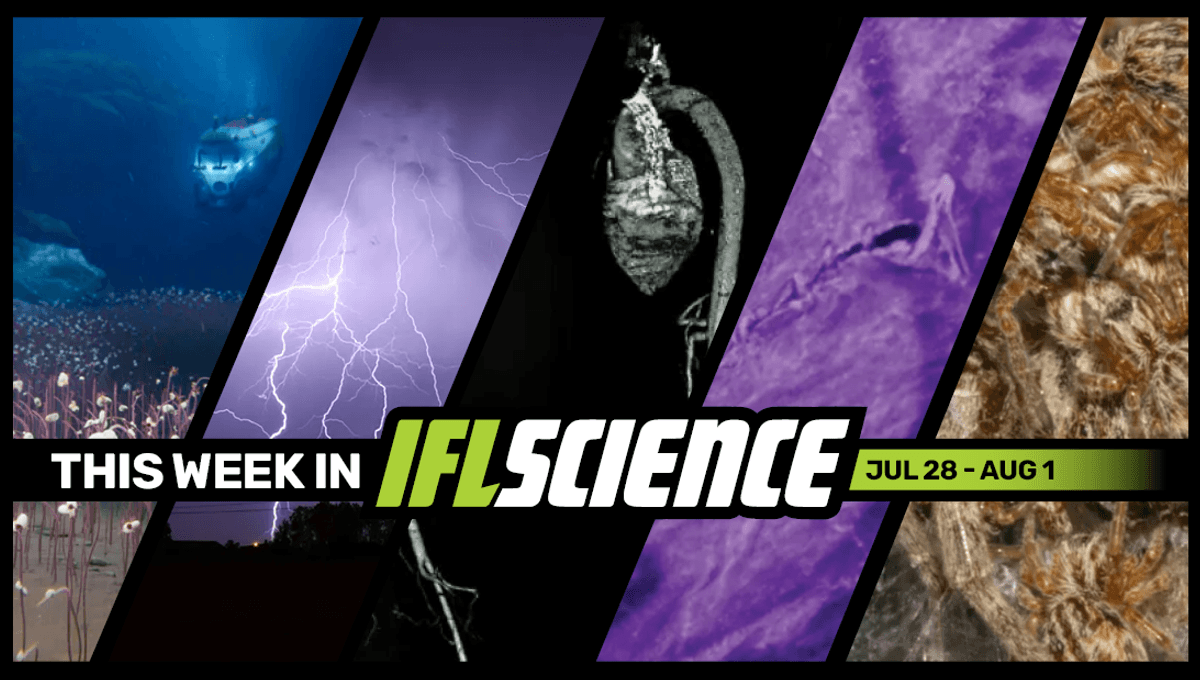
This week, scientists have discovered that one of our organs ages much faster than the others, a 2,000-year-old Siberian mummy’s tattoos provided a rare look at ancient skin art, and for the first time, the entire process of matriphagy in African social spiders has been filmed. Finally, we take an exclusive inside look at NASA’s longest-running space mission, Voyager, with someone who’s been there from the very beginning.
Create an IFLScience account to get all the biggest science news delivered straight to your inbox every Wednesday and Saturday.
The Deepest Complex Ecosystem Ever Discovered Has Been Found 9,000 Meters Below The Sea
Life can thrive in some seriously extreme environments, from the salty to the cold, and now the surprisingly deep, as scientists have found the deepest complex ecosystem ever discovered. The hadal trenches these animals call home can be as deep as 9,533 meters (31,276 feet) and play host to species that get their energy from chemical reactions. Handy, given there’s no sunlight in the hadal zone. Read the full story here
Megaflash Stretching 892 Kilometers Sets New World Record For Longest Lightning Strike
There is a new world record for the longest single lightning strike. The World Meteorological Organization (WMO) has confirmed a bolt that crossed the southern states of North America, from eastern Texas to near Kansas City in Missouri, in October 2017, stretched for an incredible 829 kilometers (515 miles), beating the previous record holder by 61 kilometers (38 miles). Read the full story here
Your Organs Don’t All Age At The Same Rate. One Is Growing Old Much Quicker Than Others
Today is the oldest you’ve ever been, and the youngest you’ll ever be. That’s just the way it is, but did you know that not all of you is aging at the same rate? New research has shown that, in fact, some of our organs age much faster than others, opening new frontiers for understanding, tracking, and potentially intervening in the effects of aging in humans. Read the full story here
Siberian Mummy’s 2,000-Year-Old Tattoos Reveal The History Of Ancient Art
Bodies preserved by the deep cold of the Altai mountains offer archaeologists a rare insight into ancient tattoo art, and modern artists are impressed by the skill some of the work displays. The first detailed exploration of one body preserved by the cold has revealed significant contrasts between the two arms. Read the full story here
Yikes! Baby African Social Spiders Filmed Eating Their Moms Start-To-Finish For The First Time
Raising offspring is expensive. It costs you time, money, and for some species, your life. This is the grisly fate of the African social spider, a dedicated mother who can only become a mother once. Why? Because her babies will eat her. For the first time, that entire process has been caught on camera. Read the full story here
TWIS is published weekly on our Linkedin page, join us there for even more content.
Feature of the week:
Voyager: An Inside Look At NASA’s Longest-Running Mission With Someone There From The Start
In August 1977, NASA launched Voyager 1 and Voyager 2 into space with no idea they would go on to become the space agency’s longest-running mission. The twin probes would end up visiting Jupiter and Saturn, and Uranus and Neptune, respectively, before going on to become the first (and only) human-made objects to get to interstellar space in August 2012. Nearly 50 years on, they continue to go strong. Over the last few years, the Voyager team has performed some impressive maneuvers from an unfathomable distance to keep them working, so to mark their continuous success, we spoke to Dr Linda Spilker, Voyager Project Scientist, about these extraordinary spacecraft, what they have achieved in their 48 years of travel, and what they are doing next. Read the full story here
More content:
Have you seen our e-magazine, CURIOUS? Issue 37 (August 2025) is available now. This month, we asked, “Are There Body Parts You Can Live Without?” – check it out for exclusive interviews, book excerpts, long reads, and more.
PLUS, the We Have Questions podcast – an audio version of our coveted CURIOUS e-magazine column – continues. In episode 11, we ask, “Why Are Yawns Contagious?”
The Big Questions podcast has returned, and we’re continuing season 5 with episode 4’s big question: How Has The Internet Changed The Way We Use Language?
Source Link: Deepest Complex Ecosystem Ever Discovered 10 Kilometers Below The Sea, 892-Kilometer "Megaflash" Lightning Sets New World Record, And Much More This Week